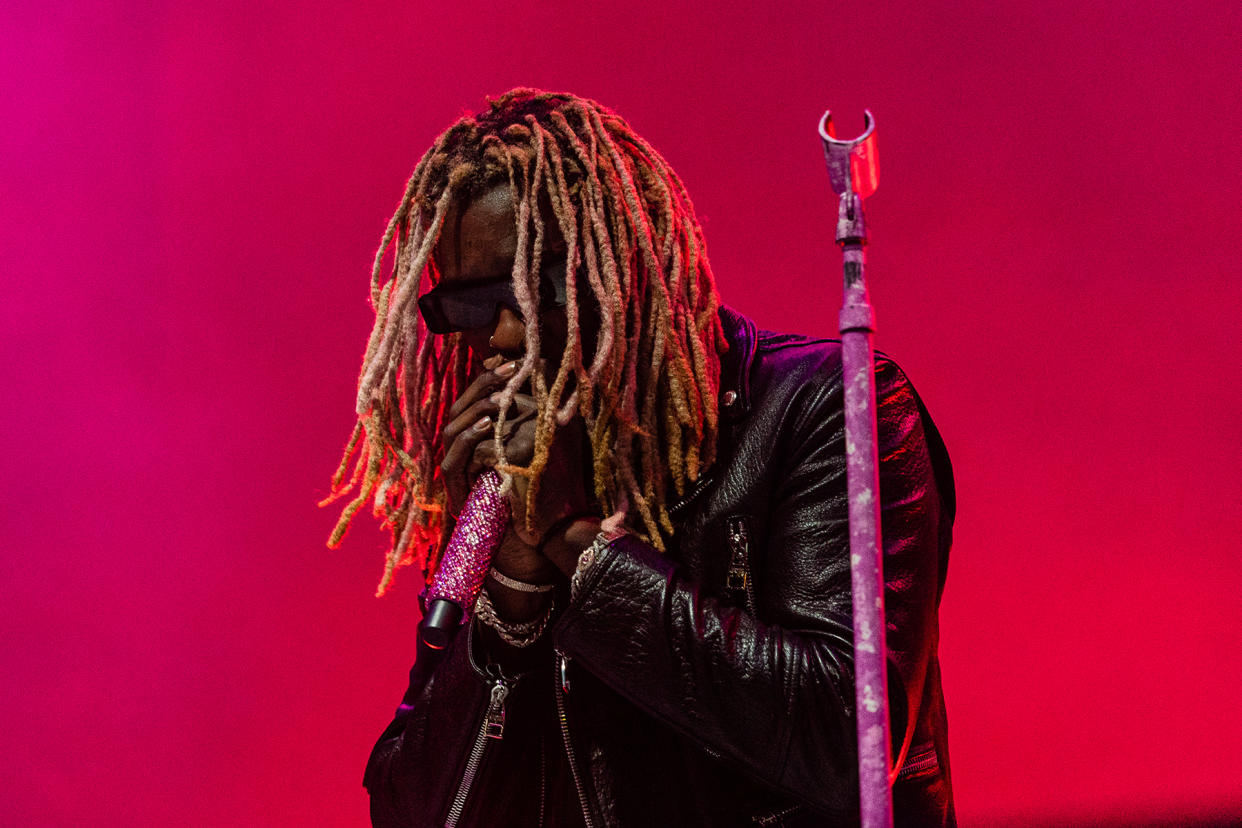Young Thug Carried the Weight of Atlanta on His Shoulders. Now, It Could Crush Him

The once-triumphant world of Atlanta hip-hop is in a state of emergency. Just days after a far-reaching, 56-count indictment named Young Thug, Gunna, and more than two dozen other artists from YSL’s roster as alleged conspirators in a well-organized criminal organization, the label’s up-and-coming signee Lil Keed passed away on Saturday, May 14th. The cause of his death remains unknown.
A protegé of Young Thug, Keed is not named in any indictment, and he was among the first to speak out on the allegations against YSL: In a post on his Instagram days before his death, he wrote that “YSL is not a street gang.”
More from Rolling Stone
Lil Keed, Atlanta Rapper Signed to Young Thug's YSL Records, Dead at 24
Young Thug's Lawyer Blasts His 'Dungeon-Like' Jail Conditions in Emergency Filing
Young Thug, real name Jeffrey Williams, is listed as the head of the supposed organization in last week’s indictment and stands accused of violating Georgia’s RICO Act as well as participating in criminal street gang activity. Many of the charges cite his lyrics as evidence of “an overt act in furtherance of the conspiracy.”
The claims drew criticism from around the rap community for their aggressive scope. “YSL is not a gang and never been a gang fool,” producer Metro Boomin wrote on Twitter over the weekend. “YSL is a registered LLC and has provided countless jobs and opportunities for underprivileged black people and really just all people cause that’s how big Thug heart is.”
The use of Thug’s lyrics in the indictment fits into broader legal trends that have been decried by scholars. “Courts have in fact treated both poems and lyrics as having evidential value,” notes Randy D. Gordon, executive professor of law at Texas A&M University. “It is of course unusual, because that tactic bumps up against First Amendment concerns.”
So far, lawyers for both Gunna and Young Thug have slammed the district attorney’s use of lyrics in the indictment. Still, requests to release the rappers on bond have been denied and they remain in custody.
The indictment alleges a massive RICO conspiracy and offers up multiple pages of so-called “predicate acts” in support of said conspiracy. “The sheer number of these acts — coupled with the dozens of defendants — will make it difficult to tie them together in a coherent story,” Gordon says. “The prosecution will also have to show that the predicate acts are related as opposed to random.”
Thug’s generosity is indeed well-documented, and it would appear that prosecutors are hoping to spin a narrative out of the musician’s public image.
In looking to connect YSL to the Bloods, prosecutors are using social media posts going back as far as the nascent moments of Thug’s career, when he still straddled the hard-fought circumstances of his upbringing to make something out of nothing. The same ability to weave stories of passion and triumph that made Thug one of rap’s foremost innovators is now being used against him.
“The tactics of using gang conspiracy charges and social media posts is all too common. Both prosecution tactics sweep broadly, capturing core suspects and hangers-on, and both tactics risk criminalizing innocent performative acts,” Andrew Ferguson, a professor of law at American University, says in an email. “We all know social media isn’t real life, so it is quite dangerous to use a format known for image-making and status building as a mirror for real life.”
Therein lies the unique tragedy faced by the current generation of rap superstars: They can find themselves squeezed between the lifestyle that brought them an audience and the stratospheric platform of modern rap music. Where the ground-level missives of earlier pioneers could potentially pass without detection, the genre today is at the forefront of mainstream popular culture, making it an easy target for prosecutors.
The indictment’s level of detail is akin to a YSL subreddit where fans dissect every move from their favorite rapper. In many ways, it hinges on Thug’s alleged position as the leader of the supposedly gang-affiliated YSL. Gordon says that a key element of cases like this is whether or not prosecutors can establish the existence of an enterprise, which in many courts means showing a clear organizational structure.
To that end, one of the songs cited is “Take It to Trial,” a song from last year’s YSL compilation Slime Language 2 that includes verses from Young Thug, Gunna, and Yak Gotti. The indictment puts particular emphasis on Yak Gotti’s line: “For my slimes, you know I’ll kill.”
I met Yak Gotti and Unfoonk last year in Atlanta while reporting on Young Thug. Having recently been released from prison, both men still had to wear ankle monitors. They both seemed to revere Thug in a way that prosecutors have willfully misconstrued. Thug didn’t appear to me as a hardened mob boss ordering various commands, but one of the few people in a number of young Black men’s lives who offered them real support. At the studio colloquially dubbed “Slime Studios,” Thug explained his view on generosity in almost Marxist terms.
“Now listen,” he said, commanding the attention in the room like a politician. “If you pick and choose who you give something to, it’s too much to worry about. If it’s 100,000 people and you give 2,000 people something, you holding these people out.”
“I’ma give 100,000 people something,” he added. “That’s what’s different with me.”
His artistic license, and that of the rest of the artists on YSL, should be respected. The passion for the many people that Thug cares for is real, deep, and visceral. If his lyrics suggest anything, it’s that under the wrong circumstances, that kind of passion can ruin your life.
Best of Rolling Stone


